10 Ways To Research Election Candidates To Be An Informed Voter
Ready to be an informed voter in the next election? Here are ten ways to research election candidates running for public office so you can better understand your ballot, make educated choices when you vote, and prioritize character and principles over party on election day.

Voting as one person in an election, especially one that draws millions of votes, might feel small or useless. However, too many people default to the mantra that their vote or their actions don’t matter. This is simply not true.
Small Margins in State and Local Elections
Many elections, especially local elections, primary elections, and off-year elections (those when we aren’t voting for major federal candidates) are often decided by just a few votes. Every vote matters.
The politicians we put in positions of power have a great ability to make our country and our communities significantly better or worse. Let’s look at a few examples to really understand the numbers. I live in Pennsylvania in the suburbs of Philadelphia, a particular hotbed for contentious and close elections, and I picked a few representative competitions for illustrative purposes.
2022 Republican Senate Primary in Pennsylvania
You can see from the image below that the Republican primary election in Pennsylvania for 2022 (which was a very significant race on the national stage) was decided by less than 1,000 votes. That’s so close! Your vote matters!
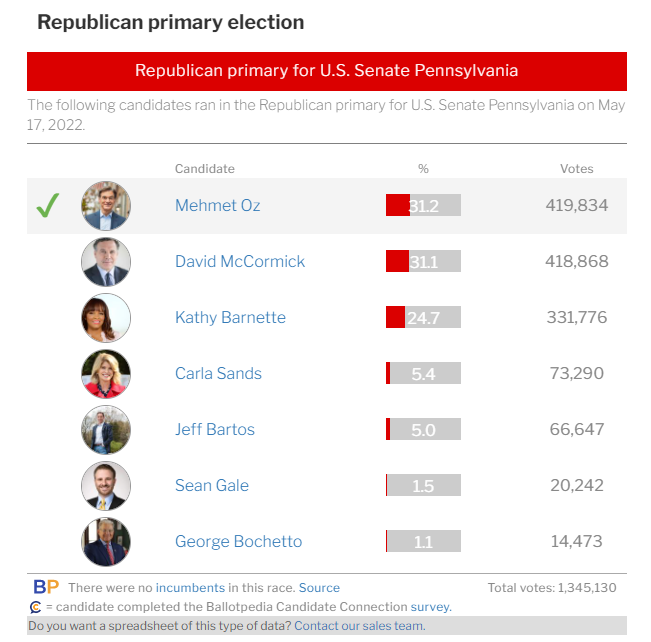
2021 Local School Board Election
Let’s go even more local to a school board election that happened in a district not far from where I live a couple of years ago in an off-year primary election. In our area, school board candidates can cross-file as both Republican and Democratic, so the results below show how many people voted for the candidates in total and then through each of those registrations. In this particular race below, there were two seats open, so the top two candidates won.
Unionville Chadds Ford School Board Seats
Look how close this race is! The first winner only won by 630 votes, and the second winner only won by 2 votes! 2 VOTES!!! Every vote matters.
| Candidate | Total Votes | Vote % |
| Mable Yu | 1,225 | 50.5% |
| Steven Simonson | 595 | 24.5% |
| Ken Kumar | 593 | 24.4% |
| Write-ins | 15 | 0.0% |
| Total | 2,428 |
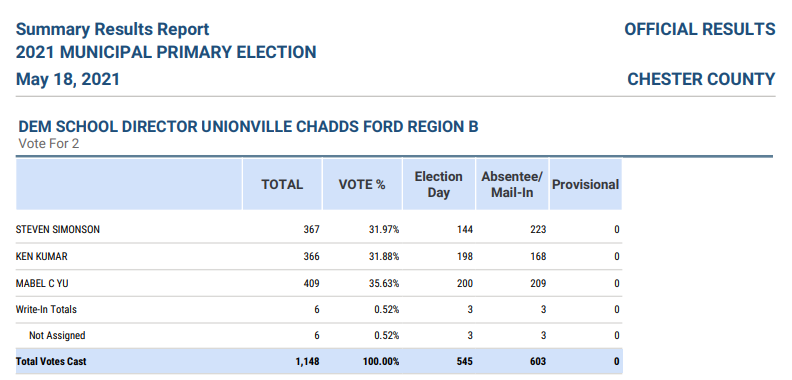
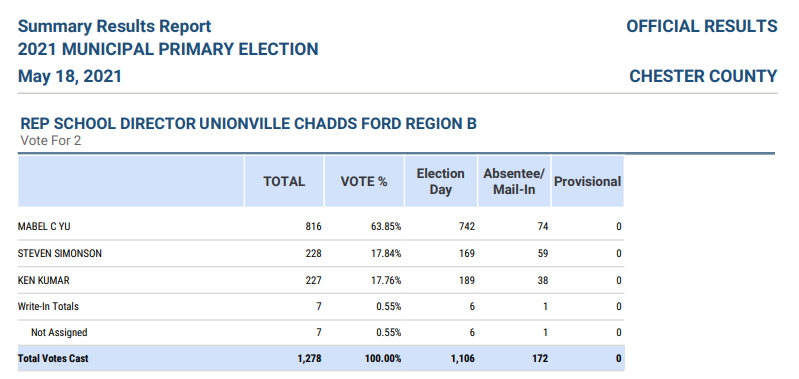
In the United States, we live in a time of deep political division (though I don’t believe we are divided as the extremists and people in power want us to believe). Our democracy has been threatened by election deniers, increasingly corrupt gerrymandering, conspiracy theories, and outright violence. Well-functioning democracy is good for just about everyone in our country, and it’s definitely good for all of us that want to live in a free and fair country.
Anti-democratic forces and initiatives are frustrating. They’re exhausting. And it’s all by design – to eventually make you feel hopeless and powerless – so those who want to consolidate power not with the people can have their way. But we can do hard things. We’ve all done hard things.
Finding ways to research election candidates, share that information with friends and neighbors, and make informed decisions about our political leaders is imperative. No one is coming to save us from the potential demise of our democracy; it’s up to us. It is up to the people of the United States to learn about how our government works, research local election candidates, and get out the vote for the candidates who want to protect our democracy.
Understanding Local Elections: The Basics
When researching local election candidates, it’s essential to understand the basics of local elections before getting into the details of each candidate’s platforms and perspectives. In this section, we will explore the election cycle, districts, and state and local ballots.
Election Cycles
The election cycle refers to the schedule of when different types of elections occur, including general, primary, runoff, and special elections. Understanding the cycle is necessary for knowing when you need to research and support local candidates. Election cycles can vary by state and municipality, so it’s essential to verify dates specific to your location.
Local Election Districts
Election districts are geographical areas in which an elected official represents the constituents living there. Local elections primarily involve municipal districts (e.g., city councils or school boards) and county districts (e.g., county boards or commissioners). It’s vital to know which district you live in and the candidates running for office within your district.
To find your district, use some of the following tools (which should be readily available online):
- Visit your state’s election board website
- Utilize district finder tools provided
- Confirm your district boundaries based on your residential address
State and Local Ballots
State and local ballots can include both candidate races and ballot measures. State ballots focus on statewide offices, such as governor or attorney general, and state legislative races. Local ballots include races for things like county and municipal public office positions, school board directors, and local ballot initiatives and measures.
When researching local election candidates, it’s crucial to examine both the state and local ballots, as state-level decisions can impact local policies and vice versa. To access your state and local ballots, follow these steps:
- Visit your state’s election board or registrar of voters’ website. Here you can find things like voter registration applications and related information as well as answers to many questions about how to vote where you live.
- Search for sample ballots or a voter information guide. Some of these are non-partisan while others are partisan. In some states (like where I live in Pennsylvania) during primary election season, you can only vote for political party candidates from the party in which you’re registered. Thus, Democrats and Republicans will have different ballots. Independents or non-registered voters cannot participate in a primary election. It’s worth noting that you can register with a certain party for the primary election season and then change your registration for the general election if that’s important to you.
- Refer to the ballots specific to your district and precinct. Ballots will also be different for each voting district, region, or jurisdiction. You should be able to find a sample ballot based on your address to ensure you are reviewing and researching the right slate of candidates.
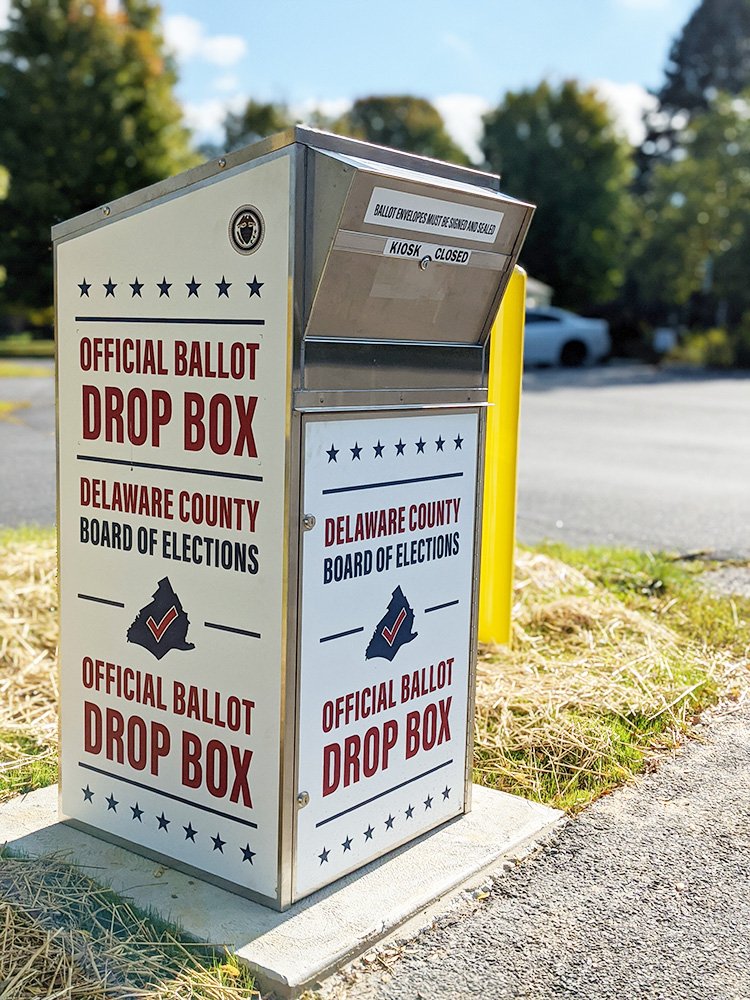
Most Governing Happens at the State and Local Levels
A few years ago, I paid next to no attention to local elections. When I voted, I chose candidates along party lines for lack of better information or just stopped voting for local races altogether (because I didn’t know who to pick). I’ve come to learn, however, that this habit is woefully misdirected.
Although many state and local elections draw few votes, most actual governing happens at the state and local levels. And these elections are often decided by just a handful of votes (as shown above), so every vote matters. That makes state and especially local elections easier to influence with fewer resources, relative to federal elections.
While the list is extensive, here are just a few examples of significant legislation, judicial action, and governing at state and local levels that have a major impact on our everyday lives.
- Day-to-day Lifestyle Circumstances: All the boring stuff of government – sewer and waste management, road maintenance, parks and recreation, etc… that deeply impact each of us every day are all local. Even when money comes from federal legislation, allocation of the money to specific projects is often left up to state and local officials.
- Book Bans: Many of these are led by elected school boards, local library boards, or county councils. Book bans are incredibly anti-democratic. A functioning democracy flourishes with informed voters who are critical thinkers. We only learn how to do this with free access to information from multiple viewpoints. Book bans silence authors, hide the truth, and marginalize specific groups of people. Most of the people ultimately making decisions about book bans are hyper-local elected officials.
- Voting Rights Infringement & Gerrymandering: Despite federal laws protecting certain voting rights, they are being challenged at state and local levels, sometimes to a great degree. Local and state officials in some places are making it much more difficult for people to vote (in local and federal elections). Most troubling, they are using corrupt gerrymandering to secure supermajorities in state legislature chambers despite much more balanced popular voting outcomes.**
- Abortion Matters: Just about every new item of legislation and challenge to abortion rights or protection has started at the state level. Who we put in state legislatures and judicial positions matters significantly on topics like this.
** North Carolina is a great example of egregious gerrymandering, the practice of redrawing district lines for partisan benefit. They have a supermajority in both chambers despite having a Democratic governor. If a Democrat can win as Governor, it’s safe to assume the state is more split than a supermajority in both legislative chambers would indicate. (This principle would also apply in a state with a Democratic supermajority in both chambers and a Republican governor.)
These supermajorities in North Carolina are due to corrupt gerrymandering of state legislative districts to all but guarantee Republicans wins in most districts. Hear more about gerrymandering and its perils to democracy in this podcast. There’s a lot more going on in North Carolina right now related to gerrymandering that is beyond the scope of this article, but suffice it to say that it’s woefully unethical.
Gerrymandering happens on both sides of the political aisle. But it’s always a bad thing, and it’s not inevitable. State legislatures should NOT be drawing the lines that dictate the voting for their own seats; this is an egregious conflict of interest. In some places in the United States and many places outside of the US, district lines are drawn by independent third parties (which seems like an obvious solution to me).
Whatever benefits accrue to your favored political party today as a result of gerrymandering will almost certainly be used against you in the future. Despite and because of gerrymandering, it’s incredibly important for everyone to show up to vote and know who they are electing and why.
10 Ways To Research Election Candidates To Be An Informed Voter
With all of this in mind, it’s important to do a bit of research on local political candidates so you know what you’re choosing. Particularly as we have more extreme and activist candidates (who often don’t represent the beliefs of many in their party), we owe it to our communities, our children, and our democracy to be informed voters.
With each election, make a plan to vote and consider using some of these ways to research election candidates to be sure you understand who you’re electing to government offices before you make these important decisions. Here are a few ways to research political candidates and become informed voters for the next election.
Start with the Big Picture
Before diving into the details, get a lay of the land for who will be on your ballot. Your local board of elections or voter registration website is a great place to start (and should be non-partisan). They should have lots of information about who is registered to run in each jurisdiction for each position and how to make sure you are eligible to vote.
Sites like Vote.org offer non-partisan information about registration, polling locations, and more. Spend some time learning about the candidates from which you can choose in your local elections (from municipal leaders to national politicians). Vote as an informed citizen and cast your ballot with confidence.
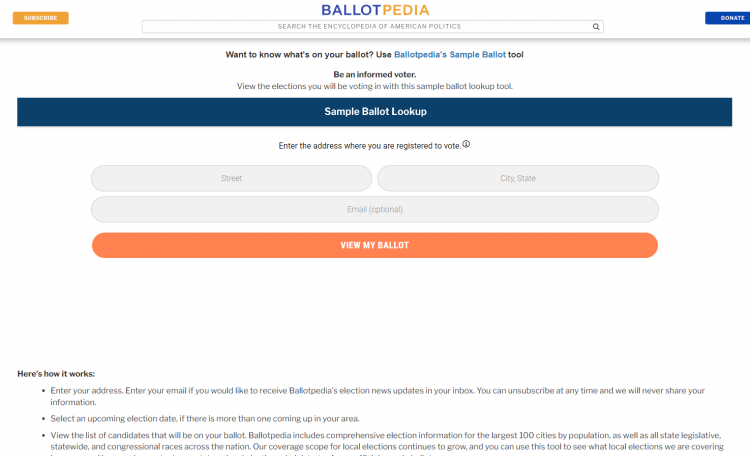
Review a Sample Ballot
Non-partisan sites like Balletopedia and Vote 411 offer sample ballots based on where you live so you can see the ballot ahead of time, know what to expect, and do research on various candidates before voting. If you’re using a mail-in ballot, you can see your actual ballot before doing research (which is one of the reasons I like mail-in voting).
You can also find partisan sample ballots from your local Democrat or Republican organizations if you would like to know who they recommend you vote for. But use these with caution, particularly with the extreme candidates some parties select these days. They can be one source of valuable information, but it’s helpful to corroborate their recommendations with other sources of information to ensure they represent your personal values and principles (i.e. principles over party always!).
Review Candidate Campaign Websites, Profiles, and Facebook Pages
A candidate’s campaign website is a good way to get a basic understanding of a candidate’s position on many topics. The website may be biased because it’s built by their team for their own advancement, but it’s a good starting point to learn about their background and the basic tenets of their platform.
And don’t forget you can compare website and profile information for competing candidates. Competitor websites can help you compare positions between two people running for the same position, help you identify what topics might be missing, and which topics are most important for each candidate.
Local Races: Major candidates for larger races will almost always have websites, but that may not always be the case for smaller elections. In our local elections, I’ve seen a couple of candidates for positions like school board directors have websites. Most, however, set up Facebook pages for their campaigns, so consider searching these for relevant information as well.
For local candidates, a simple Google search could also glean relevant results. Because they don’t have mainstream media press coverage like large elections, the top results might offer insights into their positions and affiliations.
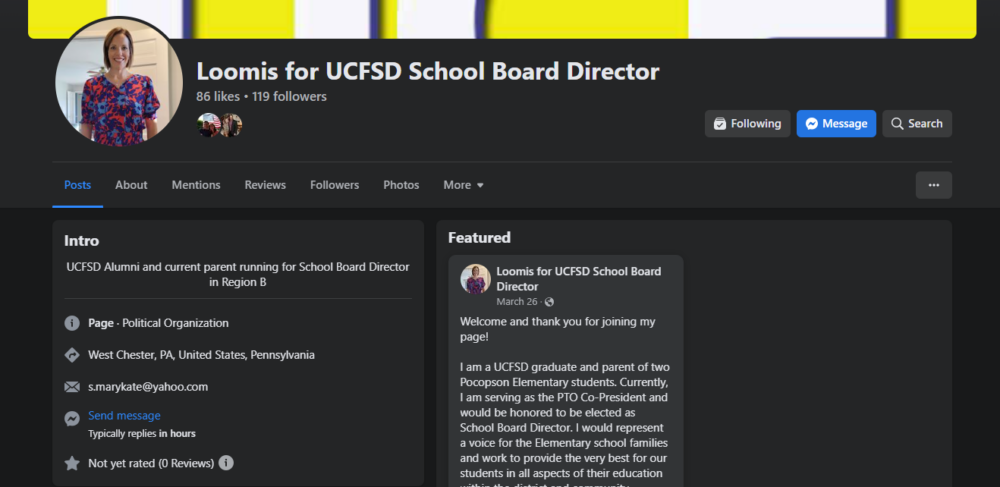
Red Flag: Be aware of any major issues that are absent from a candidate’s website. Every candidate (from any party) should be able to disclose their position on all significant issues. If they can’t, that’s serious cause for suspicion.
For example, many Republicans in recent elections are removing their position on abortion from their sites. They know lots of people within their likely voter base don’t agree on this topic. They choose not to disclose their opinion on this significant issue for fear of deterring voters.
It should be cause for concern if a candidate can’t or is not willing to disclose their stance on something, especially about the larger issues of the current time. This is essentially tricking someone into voting for them by the omission of information that the candidate knows is relevant to the voter. Not only is this cause for concern about the topical matter, but it’s also a red flag about their character and integrity.
Watch Candidate Debates
Larger races sometimes have debates between candidates. Some debates are frustrating because they seem more focused on creating snippets for social media than actually discussing topics. But debates between candidates could be one way to gather data and information about candidates in your area. This will probably be less helpful in state or local elections.
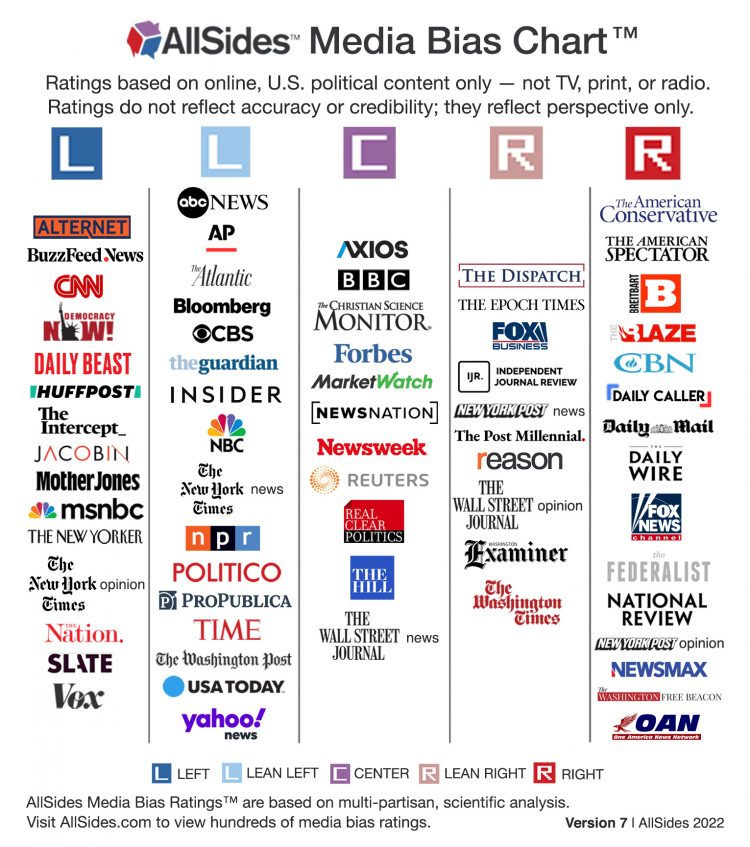
Read Articles From Center-Rated News Sources
Despite the growing lack of trust in mainstream media, there are many center-rated media sources and journalists that work hard to provide truthful and generally neutral information (no article will ever be entirely free of bias; that’s impossible as long as humans are writing, editing, and reading it). Use sites like AllSides to understand the leanings of certain media sites. Use center-rated sites to research candidates in the races on your ballot.
You can also use Right-leaning or Left-leaning sources, provided you understand the lens through which they are being reported. Sometimes, it’s helpful to read contrasting perspectives on topics from left and right-leaning sources. Far-right and far-left sources are often much harder to navigate and more likely to twist facts or promote misleading news – or even fake news – so it may make sense to bypass those types of media sources if you’re looking to be informed based on truth.
For candidates in your local races, check out local newspapers or media sites. Some of the candidates in our local elections have written op-eds in local online publications about topics that are very relevant to local issues. These give great insight into the opinions and future voting actions of those candidates. You can most likely find these by doing a simple web search with their name and city/town, though you might have to scroll past a few initial results like LinkedIn profiles or people with similar names.
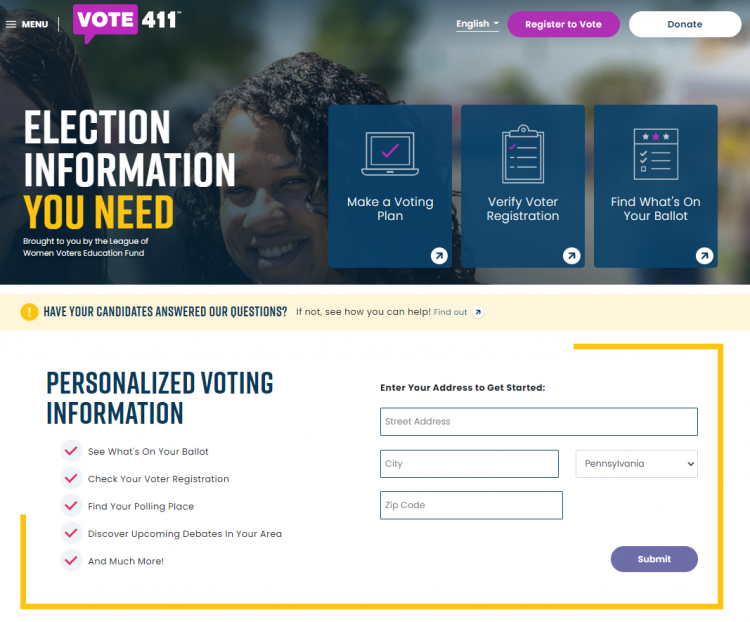
Check Balletopedia and Vote 411 For Voting and Candidate Information
Ballotpedia, Vote 411, League of Women Voters, and governmental voting websites (among others) offer information about candidates, where to vote, voting deadlines, and more. Some of these sites have voter guides and/or require candidates to submit answers to questions on particular topics (and not all candidates choose to participate) to help better understand each candidate’s stance on various topics. While it’s not a perfect forum for candidate positions on matters, it’s one more data point that could help be informed about who’s running in your jurisdiction.

Review Fundraising Sources (i.e. Follow the Money)
Most Americans widely agree that campaign finance is a complete disaster, particularly thanks to the dark money campaign contributions influencing politics and politicians allowed after the Citizens United Supreme Court decision. Unfortunately, we can’t agree on how to fix it, so we’re stuck with a political system that is largely driven by a few major wealthy donors. But at least we can see where (some) of the money is coming from so we can make educated inferences about how that money influences the candidates up for election.
Sites like opensecrets.org disclose fundraising sources for particular politicians. Ballotpedia and Vote 411, for example, have links to various fundraising disclosures for many candidates. These sites can help you find out other places to review this information.
Major donors often have significant influence over candidate decision-making, and the sources of funding can be telling about how a candidate will most likely vote on particular issues. For example, a candidate whose major donors are oil and gas companies is unlikely to vote in favor of significant climate change legislation. They may even be likely to adamantly fight against it.
Alternatively, a candidate who has Big Agriculture and Big Food companies among their largest donors may be reluctant to propose, promote, and vote in favor of policies related to regenerative agriculture or policies that support small, local farmers. Fundraising sources are not the “be all, end all” of a candidate’s positions, but they are highly likely to inform a candidate’s voting and advocacy actions.
Some state elections may have relevant fundraising information. Local elections will probably have little information about funding, though you might find something in local media. For example, in my city, there are certain large donors making significant contributions to school board elections to influence them across many districts. A little web search of local media coverage of elections might help you find some of this information. Although I haven’t dug too deep, I’ve not found databases that cover this type of local information on a broad scale.

Pay Attention to the Candidate’s Social Media Accounts
Social media can be a treasure trove of information to learn about the real perspectives of election candidates. Social media activity, like Facebook and Twitter, can provide more genuine insight into a candidate’s perspectives than their websites due to the dynamic and constant nature of social media activity.
Social media feeds may be particularly helpful for local candidates or candidates with smaller budgets. These candidates may have light websites and aren’t covered by media outlets as often. Their social media feeds, which are often much less curated, can offer insight into where they stand on topics that may not be disclosed in other areas online or in the media.
What are they posting: Most obviously, see what they are posting on their own social media account. Is it telling about their true colors? In many cases, their social media pages and profiles will probably be pretty benign, sharing photos of their family and life events. But you never know what you will find, especially when you look through the history of what they shared before they decided to run for election.
What are they resharing: Note what election candidates re-share and what they amplify through re-tweets, Instagram Stories, and other types of promotion. These types of posts are just as telling as the original content they share.
Where are they commenting: See if you can find what they are posting and sharing on forums or groups beyond their own profile. This is quite a bit easier with Facebook, for example, compared to Instagram. Searching for their name on Facebook might highlight comments they’ve left in community groups about local issues.
Remember that in local elections, many of these people are your neighbors. You might even know them personally. And they are probably participating in local community news, swap, or activity groups in your area.
Red Flag: What’s missing from social media?
Much like their website, take note of what’s missing from social media. If a candidate chooses to make their personal social accounts private to protect their family, that could make sense. But if they are actively hiding relevant information, that should be cause for concern. What are they trying to hide?
Regardless of the topic at hand, whether one disagrees or agrees with a candidate’s opinions, I think we can all agree that the candidate should be able to stand behind their own opinions authentically and fully. Intentionally hiding relevant activity on social media is not transparent, ethical, or a good indication of a candidate’s integrity.
Elected officials should be able to stand behind the things they share publicly on social media. Either they still hold those beliefs or they can share why they have learned new information that made them believe differently. It’s very telling and concerning to me when election candidates intentionally try to hide relevant information from prospective voters (and social media is a hotbed for this type of information they want to hide and you want to find).
Let me give you an example of how someone might try to hide information about themselves on social media based on a local election near where I live. There is a school board candidate in a neighboring community named Lori Peters. She’s on the sample ballot from our election board. She has a Facebook page for her campaign. She’s definitely running for the local election.
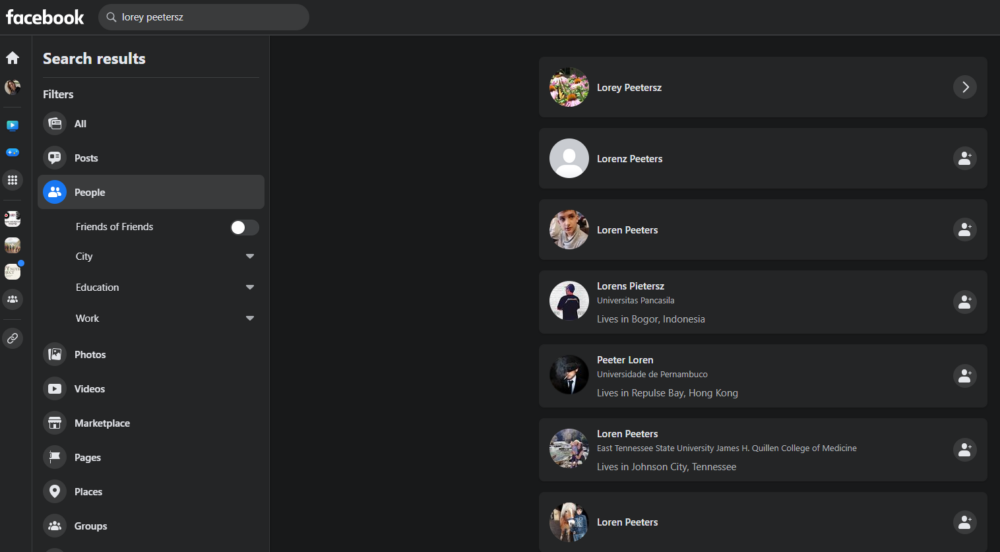
To do some research on her, I tried to find her on Facebook. Through some twists and turns through Facebookland, I found out that she made the spelling of her name a phonetic version of her real name, “Lorey Peetersz”. I can surmise that it’s her because:
- She’s the only Lorey Peetersz on Facebook I could find
- The account under this name has left comments on local school board Facebook forums that align with her campaign objectives and op-eds she’s shared in local media.
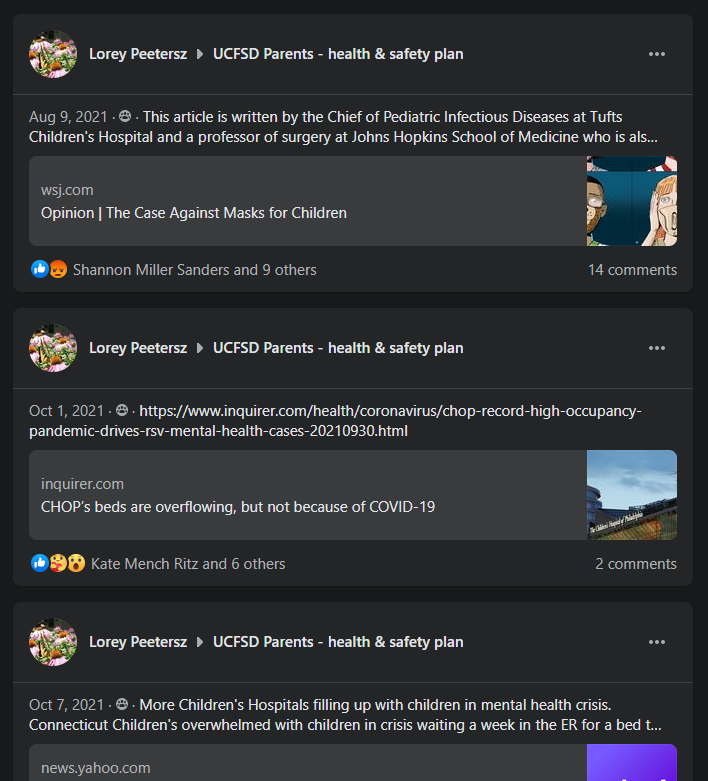
Changing the spelling of one’s name makes it harder to find comments and affiliations on public forums. If candidates want to protect their personal profiles (which I fully support to protect their families), they can simply make them private.
Update: After posting this article, a friend of Lori’s reached out to me via Facebook to say that Lori has always spelled her name this way and it’s not a change related to her run for election to the school board. Lori also left a comment to explain further her position, which is included at the bottom of this post.
I cannot fact-check this without a history log from Meta, but I will assume she’s being honest. As it relates to her positions on health and safety matters as shown in the screenshot above, she was also outspoken about this via op-eds so that was public knowledge outside of Facebook.
That being said, I’ve left this as an example of how such a situation might unfold to make it more difficult to find information about election candidates, particularly local candidates you might cross paths with in your social communities.
What organizations are they affiliated with?
To the extent you find profiles on social media, you can also see what organizations of which they’re a member. This could work effectively on platforms like Facebook and LinkedIn, and it could have positive or negative implications depending on the organization.
Getting back to our example above (and the real reason I apparently wrongly assumed her name was misspelled intentionally to hide relevant information for election purposes), this candidate appears to be affiliated with a group called Moms For Liberty (M4L).
Moms For Liberty is an extreme right-wing organization trying to undermine, especially through school boards, the value and work of public education in service of a false pretense of white-centric, American exceptionalism and (in some cases) Christian Nationalism.
This, from MediaMatters.org, pretty much sums up Moms for Liberty: “Moms for Liberty has gotten away with repeated instances of targeted harassment while maintaining some semblance of outward innocence and respectability because it falls back on the tired excuse of just being a group of concerned parents. But in reality, Moms for Liberty wields an image of caring mothers in order to covertly — and often with impunity for its public image — spread bigotry, hate, and sometimes messages of violence.” (source)
Pennsylvania is a particularly active area for Moms for Liberty. Local M4L chapters around the country are aggressively taking over school boards to do things like fire superintendents, ban books, eliminate any programs related to diversity and inclusions, influence parents directly, and more. There are even repeated instances of M4L members being legally charged with harassing other parents who disagree with their extreme opinions.
I live in a very politically-mixed area. Because school board candidates run as cross-filed and generally need broad support from the community to win elections, being affiliated with an organization like M4L probably isn’t a great look to a large portion of voters in our area.

Update: Lori responded regarding her connection to this problematic organization. You can see her comments below. Their stances on COVID policy seemed to have resonated with her in past periods but she has less connection to their curriculum attacks (which I personally view as much more problematic).
To the extent possible, seeing how candidates affiliate themselves with organizations can be telling. And truly, it could be good or bad. If they are affiliated with local organizations helping the community, for example, this could be a great indication of their commitment to positive community development. If they’re affiliated with more politically active organizations, you can probably get a decent idea of where they stand on topics and use that information as one more piece of data to inform your vote.
It’s worth noting that we need multiple data points to make an informed decision on a candidate. Do your best to consider various aspects of their platforms, social media perspectives, affiliate organizations, etc… to get the best idea of what they plan to bring to the table.
Review Organizations That Endorse Them
Take a look at organizations that are endorsing their candidacy. That should give you an idea of what they support. For example, we have several school board candidates for races in our area that are endorsed by either Moms For Liberty or Together for Public Schools. The websites of each of their endorsement organizations give clarity to the platforms of the election candidates, even if the public information on the candidates themselves is thin.

Word of Mouth, Host a Ballot Club, or Other Community Conversation
Talk to your neighbors to share what you know about different candidates. This can be informally through casual conversations and friends or through more formal meetups and candidate events. Particularly for local elections, word of mouth (as a critical thinker wary of unfair gossip) can help understand what a potential candidate brings to the table.
In small to medium-sized communities, school board directors, mayors, and other local elected officials are your neighbors. Their children go to school and play sports with your children. They are present in your communities as their most authentic selves, despite what their curated websites and Facebook political pages might say. A single opinion may not be complete, but a trend is often telling.
You may even host something like a Ballot Club, a social gathering where people from different parties and political leanings meet to review sample ballots and do research on each of the candidates. Together, you can round up information about candidates, share notes, and become more informed voters. The event does not have to involve sharing any voting tendencies or plans. It’s simply a place to gather and exchange information about candidate positions and actions.
How else do you become informed and learn more about the candidates running in your area so you can vote based on principle, character, and facts (and hopefully not default to partisan voting without a more robust context)?
If You Like Ways To Research Political Candidates, You Might Also Like
How To Use The Library To Vote
How and Why To Break Up With Amazon
Book Review of Forward: Notes on the Future of our Democracy
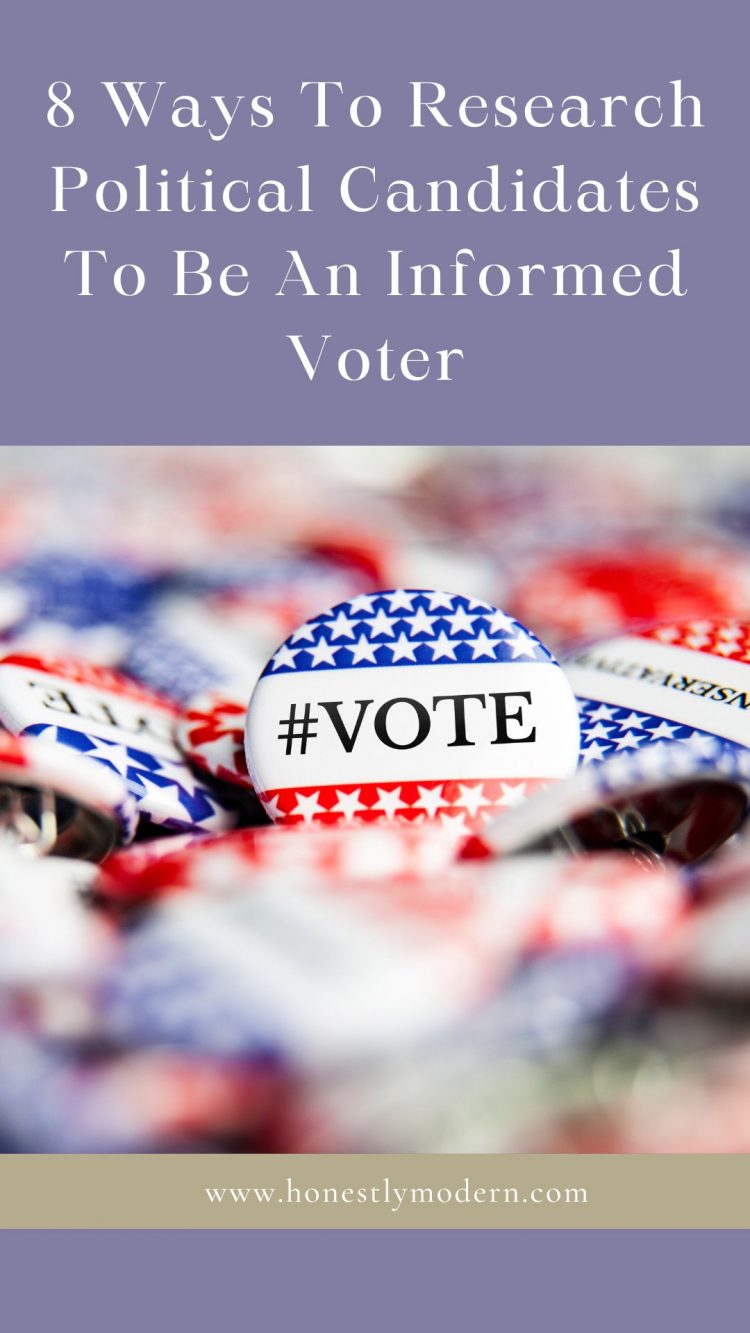

Jen Panaro
Jen Panaro, founder and editor-in-chief of Honestly Modern, is a self-proclaimed composting nerd and advocate for sustainable living for modern families. To find her latest work, subscribe to her newsletter, Stepping Stones.
In her spare time, she’s a serial library book borrower, a messy gardener, and a mom of two boys who spends a lot of time in hockey rinks and on baseball fields.
You can find more of her work at Raising Global Kidizens, an online space to help parents and caregivers raise the next generation of responsible global citizens.





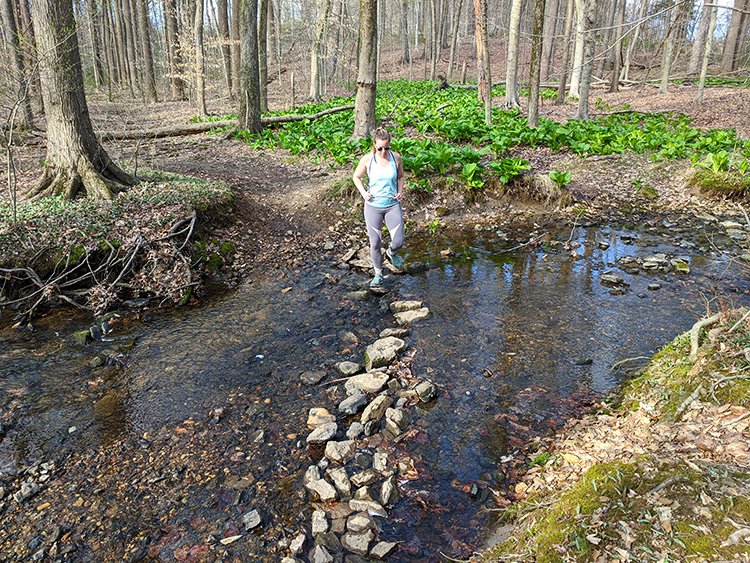
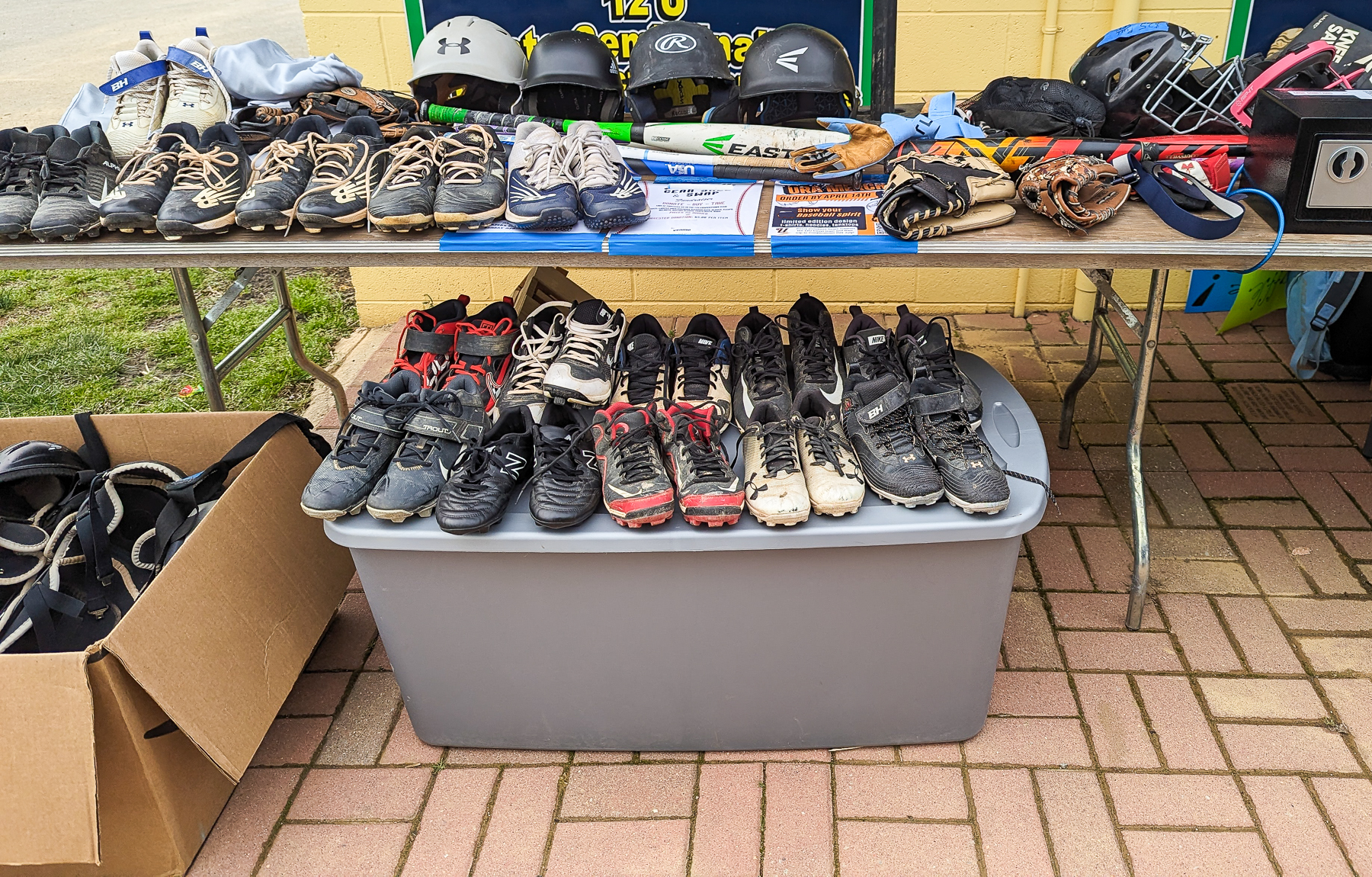

I am Lori Peters and I’ve never hidden my identity or school board positions . Everyone in my district who followed SB happenings knew exactly where I stood on masking and Covid restrictions on kids as I spoke publicly at over a dozen school board meetings and wrote op-eds in local newspapers as well as on FB groups. The reason my FB page goes by a different spelling is that I had a history of a stalker many years ago and I did not want my former stalker being able to search for me and find me on FB but I did want people who I decided to friend or message to be able to tell who the message came from by reading it phonetically. I joined FB well before Covid or any political activity to be able to find out about local happenings when I moved to the area. Later, when I became vocal about my opposition to continued masking of kids, that was just the account I had already set up. If I was trying to hide my identity from locals while I rallied support to remove masks from kids, I think I would have been smart enough to choose a name that wasn’t phonetically identical to my real name and post publicly with it.
Thanks for sharing this Lori.
Thank you, Jen, for allowing me the chance to reply. I would also appreciate the chance to address the part about being “affiliated” with Moms for Liberty. As I have said, I was very passionate in 2021-2022 about restoring normalcy for the children and I therefore set out both to rally support and to attempt to change minds. I took my message both where it would be received (M4L was actively pushing for “normal” as was UCFSD Parents for Brick and Mortar Learning) and where it would not be well-received, but where I hoped to change some minds (UCFSD Parents-Health and Safety Plan, for example). Just because I posted or commented on a page does not mean I endorse everything that everyone else on that page says or does. I am not a “member” of M4L, as I pay no dues (if there are any?) nor have I ever attended one of their meetings, nor do I agree with many of the things some of their members have said or posted. Nor do I have their endorsement of my candidacy nor did I seek it. I think it would be fair to say that I am more on the “conservative” side of many issues, but not always, but I also I try to consider each issue independently of any political affiliation. I was an Independent until very recently, and I registered as a Republican prior to my candidacy, as our system makes it quite difficult for candidates outside our 2-party system and that was the closer fit for me. Anyway, I appreciate your willingness to allow me to respond. Have a nice evening- Lori
Hi Lori – Thank you for sharing this. I appreciate you being open about your positions. I believe we have plenty of space for respectful conservative positions, and have particular concerns with the harmful actions from M4L nationally like book bans and their aggressive curriculum redesigns that focus on the exclusion of a comprehensive and honest perspective of our country’s history (as examples). I’m glad to hear this is not an important element of your plan should you win election to the school board. I also FULLY appreciate that running as an Independent is next to impossible (our election system needs a serious overhaul). Thanks again for sharing your perspective.